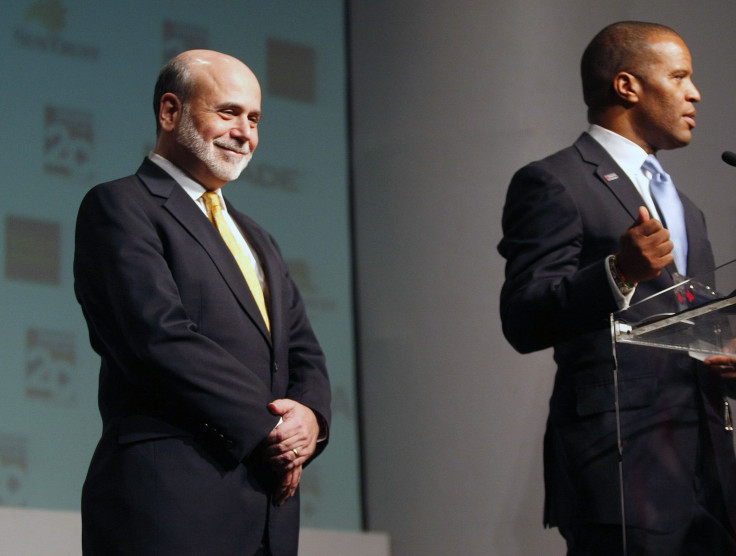Low Wage Growth During Great Recession Could Have Been Much Worse, Fed Study Finds

Are you a 30-something middle manager who’s held fast to your job the past four years even as friends and colleagues kept getting pink-slipped, and are working twice as hard without even thinking of asking for a raise? Are you a late-career professional laid off in 2008, forced to accept a position that makes 30, 40 or 50 percent less than your previous job? Are you a recent humanities graduate in your early 20s, daydreaming about the “good job” your college degree was supposed to entitle you to, rudely interrupted mid-fantasy by the customer telling you that yes, she would like fries with that?
If so, the Federal Reserve Bank of New York has some good news for you. Yes, economists at that central bank branch are saying, the recession might have put a damper on your earnings potential and you have every right to be mad about that, but really, you should cheer up a little: It could have been a lot worse.
That seems to be the main conclusion to be found in a blog post published Monday by that regional bank’s Research and Statistics Group, which noted that the large drop in output caused by the recession, what economists refer to as “slack” in comparison to the economy’s true potential should have resulted "in a further slowing in compensation growth.”
Citing two studies conducted at the Boston Fed, and crunching data on wage growth and unemployment since 1997, the researchers found the “change in compensation growth” -- or how much the average worker is seeing in raises over a year -- does not have a linear relationship to the unemployment rate. Further, plotting the data on wage changes against unemployment ends up creating a Phillips curve pattern, where large increases in the number of unemployed do not correspond to equally large decreases in the salaries of those that still have a job.
In other words, wages are just not falling as much as economists would expect them to, given the high numbers of unemployed who should, in theory, be knocking on factory doors offering to labor for less than whatever it is employers are paying their current workers.
"Clear The Labor Markets"
The economists’ study is an affirmation of a long-held belief in Keynesian macroeconomics that wages (and other prices) are somewhat “sticky” and don’t respond to market shocks in efficient ways over the short term. Or as the economists put it “in a situation of high unemployment […] real wages don’t fall sufficiently to clear the labor market.”
It also appears to confirm a recent and thought-provoking National Bureau of Economics Research paper by economists at Columbia University and the Paris School of Economics which found that, due to the mechanics of credit markets, recoveries after a financial crisis behave differently from previously assumed. In a high-inflation environment, the fallout from crisis might lead to “wageless recoveries,” those economists found. In a low-inflation economy like the U.S. at present, recoveries feature high joblessness but don’t affect wages as much.
Both the Fed and NBER research sound the alarm with their main findings, challenging the way policymakers understand economic data. The Fed post notes economists who use movements in wage data to determine how the economy is doing might be relying on a treacherous metric, one that “may not be informative about the extent of slack or its change.” The NBER paper, meanwhile, concludes that, if policymakers want to address the current jobs crisis, “standard fiscal and monetary policies may be ineffective in speeding up full recovery, and policies that address the weaknesses of the credit market should take center stage.”
"Better Off?"
But while those findings are useful, the main idea that the working masses are doing better in the Great Recession than could be expected salary-wise is sure to stick many in the craw.
After all, as their colleagues at the Cleveland Fed noted a few months ago, the share of labor income as percentage of GDP has dropped dramatically since the recession, retreating almost as much in the five years since the beginning of the global financial crisis as it had in the 30 years just before. All of that is driving a huge rise in income inequality, which makes people feel even poorer than their nominal salaries would suggest. (You might be happy with your $46,000 salary and never-say-die 1998 Corolla if that’s the kind of lifestyle your neighbors, friends, family members and college buddies also have. But if everyone around you suddenly starts talking about their weekend trips to Paris and late-model Maseratis, economists have found, you’ll feel much less well-off).
And, of course, research like this always tends to end up in the hands of pundits, who will debate ad nauseam whether it means we’re doing better than should be expected in an absolute, relative, exponential, logarithmic, metaphysical, quantum and abstract deconstructionist sense.
Translation: The election might be over, but the debates about “Are you better off now than you were four years ago?” have only just begun.
© Copyright IBTimes 2024. All rights reserved.











